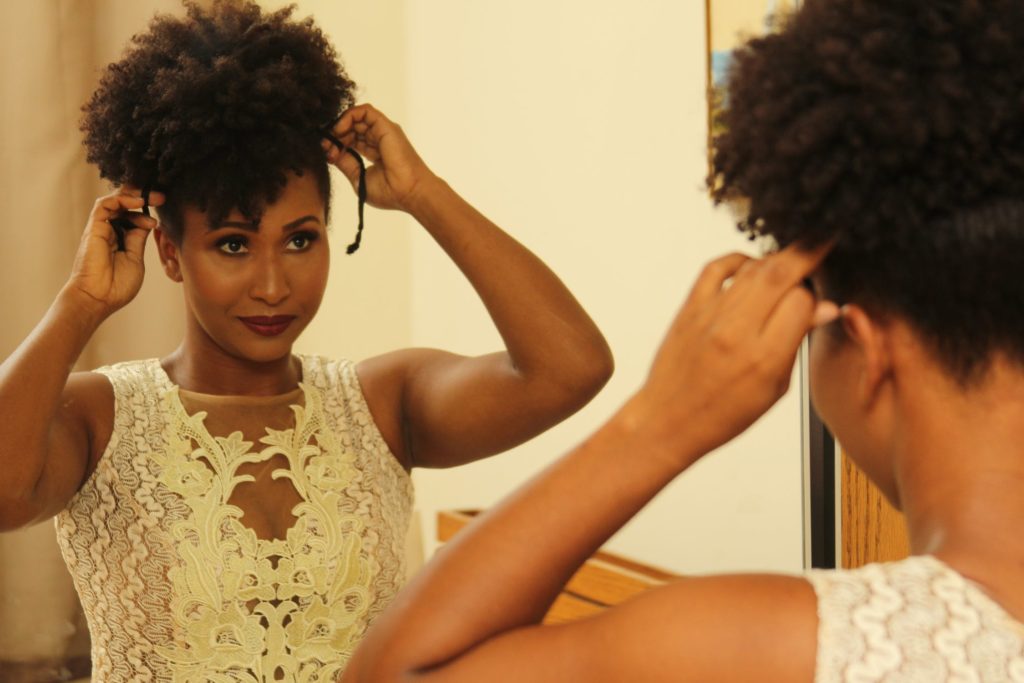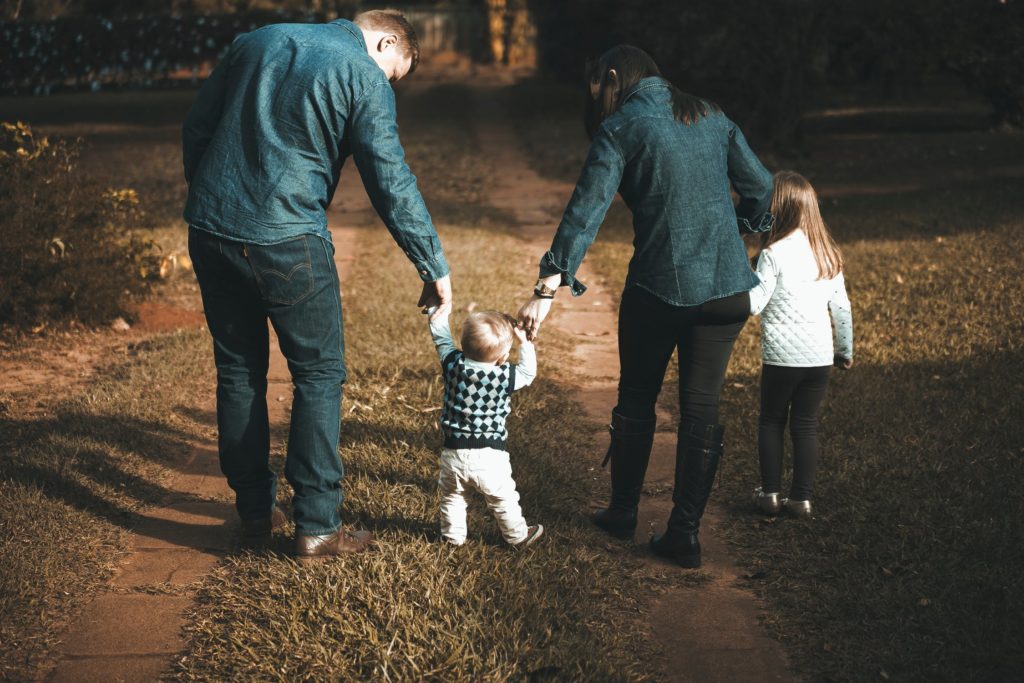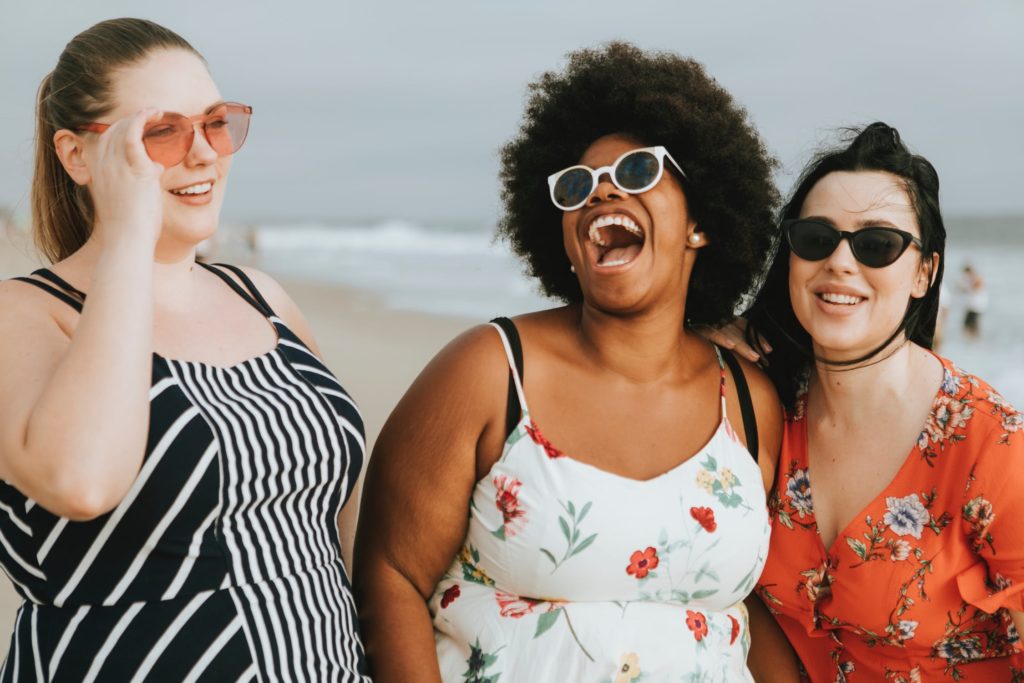Did you know that there is a huge correlation with having a healthy body image and having inner (notice, I didn’t say outer) confidence?
It’s true.
Every day millions of people start their day in a sad way. They stare at themselves in the mirror and fret over all of the things that are wrong with the way they look. Maybe they’re unhappy with their nose or neck skin. Or perhaps they don’t like the extra inches around their waist and the dreaded muffin top that is created when they put on pants. Maybe they hate their hips or the dark circles under their eyes.
Almost everyone has something that they don’t really like about the way they look. Unfortunately, these strong negative emotions can subconsciously impact other areas of our lives. They can eat away at our confidence and self-esteem.
Every single person has what’s called a “body image.” Ideally, we should love and accept our body the way it is. This would be considered a good or positive body image. However, many people have a bad body image or a body image that can use some adjusting.
What Is Body Image?
In medicine and psychology, body image refers to a person’s emotional attitudes, beliefs and perceptions of their own body. We’re not born with a body image. It’s something that develops as we mature and grow. As we become more aware of ourselves and others, we start to compare. In today’s digital age, we even have social media to help us out.
According to Brown University’s Wellness website, body image includes:
How we perceive our body visually
How we feel, think and talk to ourselves about our body
Our sense of how other people view our body
Our sense of our body in physical space
Our level of connectedness to our body

It is somewhat natural to care about how we look and are perceived by others. It’s normal and good to have a body image and to be aware of your body and how you look. What isn’t so great is if you have a poor body image and feel badly about how you look.
Why Is Body Image Important?
A positive body image can make your life much happier and you feel more confident. If you have a positive body image, you feel good about the way you look. You may realize that your appearance isn’t perfect or doesn’t match the “ideal” or what’s presented in the media, but you’re still proud and confident.
A negative body image happens when you feel like your appearance doesn’t measure up to the ideal or what the media portrays as beautiful or attractive. You feel inadequate and may often compare yourself to others. According to psychologists, people with a negative body image are often unrealistic. They have a bit of dysmorphia in that they don’t see their appearance as it really is. They may view themselves as heavier than they really are.
For example, one experiment had women lay on the floor and close their eyes. They were instructed to make a circle with their arms that reflected the circumference of their hips. Most women’s circle was so large that they wouldn’t fit through a standard door, yet their hips were nowhere near that size.
People with a negative body image view their body in a distorted way and do not actually see what they really look like. This unhappiness and negative perception of your body or face can lead to serious problems. For example, there is a rise in eating disorders for both men and women, and the age of people suffering from eating disorders is getting younger. Even small children are now suffering from negative body image.
It is normal to have negative thoughts about certain parts of your body from time to time. However, if your body image is negative and this feeling persists, it could be a sign of a deeper problem. Before we talk about how to turn it around and embrace a more positive body image, let’s take a look at how body image develops.
If the way you see yourself overall is negative, and this perception persists for a long time, it could be a sign of a problem, and possibly a serious one, psychologists say.
How Does It All Go So Wrong? Where Does Your Body Image Come From?
We’re not born with a body image. In fact, we’re pretty unaware of our body in comparison to others until early childhood. As we head to school and we begin consuming media messages, we begin to form an image of ourselves. Family and respected adults play a role too.
Imagine being a young child and constantly hearing, “Oh isn’t she cute. She’s so chubby.” The adult probably doesn’t mean any harm – however, constantly being called chubby when the media tells you that you should be thin, can begin to take hold.

Here are five areas of a person’s life where body image can be supported or negated:
1. Messages from family (and close friends)
As previously mentioned, the comments and attitudes from family can make a significant difference in your body image. If a parent is supportive rather than critical, a child can grow up feeling good about themselves. However, critical parents or parents who struggle with their own body image can raise children that have a negative body image.
A word of caution to parents: Parents protect your children. Continue to speak words of encouragement and build your child’s self esteem while their young. If at all possible, shield them from those careless adult naysayers who struggle with their own insecurities and as a result find it necessary to hinder a child’s healthy development with their unbridled tongue.
2. Milestones
Children go through many milestones as they grow into adulthood. These milestones play a pivotal role in their body image as many of the milestones are emotional as well as physical. Puberty, for example, is a significant milestone for both boys and girls. Their body changes dramatically and if they’re supported through this sometimes awkward transition, then they’ll strengthen their positive body image. If they’re not supported, or they receive enough negative messages from the media and others, then they can develop a poor self-image that they can carry with them into adulthood.
3. Illnesses
Illness isn’t something that most people have to deal with. However, as you get older, how your body feels can have an impact on your image.For example, a woman struggling with an immune disorder may feel weak or inadequate. Her fatigue may be real and stop her from enjoying a vigorous exercise routine.
4. Stress, Hormones and Emotions
Your emotional state can have an impact on how you feel about your body, too. If you’re under an abundance of stress, you may begin to feel negative about life and about yourself. Depression can also, as you might imagine, affect how someone feels about their body. While changing hormones can wreak havoc on a woman’s physical, mental and emotional state.
5. The Media
This is the biggie and what most people refer to when they talk about negative body image. From the first time a child peeks over their parent’s shoulder at a magazine or watches television, they’re inundated with media images. They begin to form an opinion about what people are “supposed” to look like. They get a distorted view of the ideal body type and an impossible standard is set.
Here are a few statistics to consider concerning body image:
According to a study funded by the National Heart, Lung and Blood Institute, in a survey of girls 9 and 10 years old, 40% have tried to lose weight.
One study reports that at age thirteen, 53% of American girls are “unhappy with their bodies.” This grows to 78% by the time girls reach seventeen.
Five to ten million adolescent girls and women struggle with eating disorders and borderline eating conditions.
While the media plays a role in a developing body image, it’s not actually the strongest influence. Your peers and family members have a more significant impact on how you view yourself. Thankfully, your view isn’t set in stone.

The good news about body image is that you can get a new body image, starting today! That’s right you can actually change the way that you feel about yourself. Not by being overly protective of how you look. Remember, the key to this new mindset is rooted in not comparing yourself to others and not looking for approval in all the wrong places.
But first, let’s look at why it’s so important to feel good about your body and how a positive body image impacts all aspects of your life. Then we’ll wrap it up with a few steps to feel better about your body and how you look right now.
The Most Important Elements of a Good Body Image
A healthy body image provides a never-ending list of benefits and it impacts your life in a positive way.
You have a positive body image when you have a realistic perception of your body and you enjoy your body. You might enjoy the way it looks in clothing. You might enjoy how your body performs during exercise – you feel strong, or fast, or skilled. You might enjoy the way your body keeps you healthy.
Attention: When you feel good about your body, you take better care of it. This is important – one of the reasons that many experts feel that obesity is on the rise is because of the non-stop inundation of “ideal” body images from the media. It causes a person to constantly compare themselves to these images and they inevitably come up short. It can cause a person to give up and give in to poor choices because we instinctively don’t take care of what we don’t love.
Those images aren’t real.
Those images are meant to serve a marketing purpose.
Those images are not meant to serve you.
Most people will never look exactly like that.
Positive body image also means that you understand that healthy and attractive bodies come in all shapes and sizes. You know that everyone, including yourself, has many attractive characteristics. This attitude not only helps you feel better about yourself, it also helps you connect with others and appreciate them for who they are on the inside and the outside. You have better relationships with people.
Finally, a healthy body image means that your view of your body is separate from your self-esteem. Your self-esteem and confidence actually come from who you are on the inside. When you feel comfortable with how you look, you are confident to pursue your interests and be the person you are meant to be. You don’t let your body image get in the way of being happy and productive.
Sounds great, right?
If you do have a negative body image or you think your body image could use a little positive shine, then the last section will help you begin to take steps to feel not only comfortable in your own skin but also proud of it. Thereby, boosting your happiness and your confidence.
Five Simple Steps to Skyrocket Your Body Image:
There are actually dozens of different steps you can take to begin to take back your body and to feel proud of it, but, let’s start this journey with these five:
1. Make a list of all that your body does for you.
Your body keeps you alive. It’s an amazing and powerful thing. Every day you continue to breathe and your heart continues to pump is astounding. When you’re sick, your body pulls out all the stops to return you to health. Your legs take you to the park. Your arms hug. Your face expresses your emotions. Your body is wonderful.
2. Find something that you like.
We all have at least one outstanding physical trait. Instead of focusing on the 99 things that you don’t have. Try focusing on the one amazing thing that you do have and love about yourself. My young adult daughter taught me this one day as she was staring at my skin.
What do you like about your body? Do you have great legs? Do you have a beautiful neck? Do you have a warm smile or mysterious eyes? Is it your skin tone, your eyebrows, your hair or your shoulders? Start appreciating your body by making a mental list of what you like about it.
3. Move your body.
Start engaging in physical activity that makes you smile and feel good. Maybe you like dancing or lifting weights. Maybe you enjoy spending time with your dog – go for a walk or play ball together. Ride your bike, jump rope, learn to rock climb. Start moving your body and you’ll gain a new appreciation for it.
4. Avoid triggers.
If weighing yourself makes you feel bad about your body, stop doing it. If reading fashion magazines makes you feel bad, stop reading them. If watching television makes you compare yourself to actors, stop watching television. Take control over your mindset and eliminate activities or triggers that put you in a negative mood. If it’s a joy vampire that’s triggering you with their negativity, then remove yourself from their presence.

5. Find a positive role model.
There are many people who have a similar body type to you. Find a role model that you can relate to. There are tremendously talented fashion bloggers, actresses, chefs, business owners and models that don’t fit the media’s “ideal” body type. Surround yourself with positive images that make you feel good and supported.
Developing a positive body image not only helps you live a more rewarding and satisfying life, it also helps you support the people around you.
When you embrace a positive self-image, you’re helping others who may be struggling. You’re a role model and can have a positive and profound impact on their life too. And let’s face it, life is a lot better when you stop comparing yourself to others and you love yourself for who you are and celebrate what you bring to the table.
All the best,
Elaine
